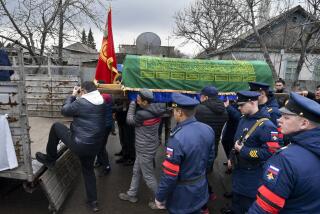Kyrgyzstan Votes on Legislative Changes : Asia: Referendum in former Soviet republic is expected to back president. It may weaken democracy.
- Share via
BISHKEK, Kyrgyzstan — This mountainous republic has 4.2 million people, twice as many sheep and a reputation among approving Westerners as the most liberal of the five new Central Asian nations.
On Saturday, however, Kyrgyzstan held a referendum on constitutional changes that some observers think may lead it away from democracy and toward stronger presidential rule.
Official results were not available, but a turnout of better than 74% was thought to ensure that popular President Askar Akayev will win the “yes” vote he seeks.
“It’s a feature of our people,” said Jenish Sasekbayev, a Bishkek computer specialist, after he cast his vote. “Even if he has no bread in his house, a Kyrgyz will say his government is good.”
If the “yes” vote prevails, it will be partly a legacy from Soviet days, when voters knew what was expected of them. It will also mean a seal of approval for Akayev, a 49-year-old former math professor who has endeared himself to the West by moving his country quickly toward free-market reform but who has also dissolved his Parliament and shut down two newspapers that criticized him.
Diplomats point out that the referendum question contradicts Kyrgyzstan’s new constitution--signed by Akayev--which says that only Parliament and the constitutional court can make constitutional changes.
“Why play with the system so that the president can control it?” said Nikolai Kokhanov, a Communist who edits the Pravda Kyrgyzstan newspaper. “The president used to say the constitution is democratic, and experts agreed. But after a year, the president decided to make changes in the constitution.”
The results of the referendum will determine whether Kyrgyzstan should have a slimmed-down, professional Parliament to replace the old Soviet-era legislature, which Akayev disbanded in September. Voters were also asked whether important political decisions may in the future be decided by referendum.
The president’s critics say he is trying to set up a system that will be easier for him to control. The two-house system he prefers would put a body of 35 members in charge of day-to-day legislative work. A larger house of 70 lawmakers would meet only occasionally.
The government argues that a small, professional Parliament would be more efficient than the old legislature, whose unruly deputies were paralyzed by internal intrigue.
Akayev has called for new elections in December, but a majority of deputies said they will boycott.
Perched on the Tian Shan Mountains bordering western China, Kyrgyzstan boasts spectacular scenery. Its people were sheepherding nomads until Soviet authorities forced them into collective farms and towns.
Seventy years of Soviet rule failed to erase their passion for wide open spaces. As soon as Moscow’s rigid controls let up, the Kyrgyz returned to an open, informal style of life.
Akayev is the only Central Asian president who was never a Communist chief, and he has good relations with the International Monetary Fund and the World Bank, which hope to spread his brand of “new thinking” in Central Asia. The IMF has approved a three-year loan of $140 million to Kyrgyzstan to support its economic and reform program until 1997.
The republic was badly hurt by the demise of the centralized Soviet economy, since most of its industries shipped in raw materials and sent finished products elsewhere in the Soviet Union.
Now these factories cannot get supplies, and many have closed down. Former Communist lawmakers often blame the resulting hardship on Akayev’s policies, saying a free market helps only the rich.
More to Read
Sign up for Essential California
The most important California stories and recommendations in your inbox every morning.
You may occasionally receive promotional content from the Los Angeles Times.













